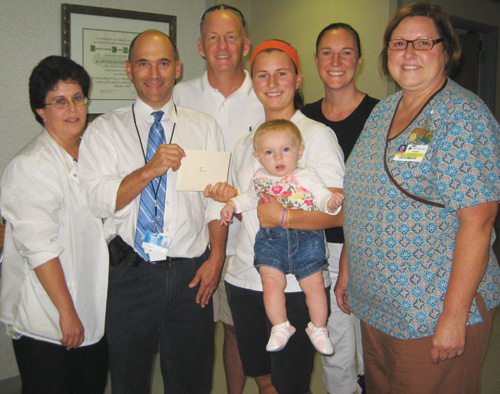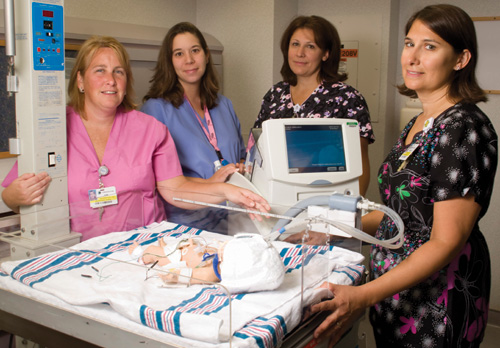Neonatal unit delivers advanced care and support to prevent brain injury


Within minutes of birth on Feb. 2, baby Mia Lang was diagnosed with hypoxic-ischemic encephalopathy (HIE), a condition in which not enough blood goes to the brain. Untreated, HIE can permanently damage the brain, kidneys and liver.
Mia was only the fifth baby to be treated at Christiana Care by selective head cooling, a treatment in which a special cap is fitted on a newborn’s head. Cooled water circulating through the cap helps to prevent brain injuries. Christiana Care’s Neonatal Intensive Care Unit (NICU) is the only facility between Philadelphia and Baltimore to offer head cooling.
Mia’s dad, Jeff Lang, is grateful the NICU had the expertly trained staff and equipment his daughter needed in a crucial situation.
“We are fortunate to have a hospital in our community that invests in the latest technology so it will be there when we need it,” Jeff Lang said. “Beyond that, the day-to-day support of Dr. David Paul, our neonatologist, and the nurses was tremendous.”
Mia’s big sister, 16-year old Maddy Lang, raised $350 as her way of saying thank you to the NICU.
“I thought I should give something back to the people who helped make my sister a healthy, happy baby,” she said.
Christiana Care’s NICU treats 1,100 babies a year, including about 250 transferred from other hospitals in Delaware, Pennsylvania, Maryland and New Jersey.

The notion of induced hypothermia for newborns dates back to the 18th century, when physicians described immersing babies in cold water to stimulate breathing. In recent years, controlled cooling has emerged as the standard of care for babies with HIE and asphyxia, a condition in which carbon dioxide builds up in an organ that isn’t receiving enough oxygen.
At Christiana Care, the head-cooling unit was launched in May 2009, after more than a year of preparation and training. In the first year, the NICU team treated eight babies with moder ate to severe HIE or asphyxia.
“The babies who benefit most are the ones who have had moderate injuries,” said Annette L. Rickolt, MSN, APN, RNC, clinical nurse specialist and coordinator of the program. “Head cooling also offers the additional benefit of having few side effects.”
Although the technology has produced impressive initial results, not all babies avoid brain injury. Mia and other newborns who have been treated will be followed until they are at least 3 years old by doctors, nurses and therapists who will monitor their development.
Typically, babies are treated within six hours of birth. But head cooling also is used to help infants who develop problems well after birth, even at other hospitals. For example, the Christiana Care NICU team mobilized staff, equipment and expertise recently to help a baby who had undergone surgery at A.I. du Pont Hospital for Children in Wilmington. Within weeks of treatment, the baby was feeding from a bottle and headed home. According to Fern Butler, MSN, RN, NICU nurse manager, the response was a true team effort that included the support of Gary Ferguson, executive vice president and chief operating officer, as well as individuals in the transportation department.
“I am especially proud of my nurses who volunteered without hesitation to go to A.I. to operate the head cooling equipment, our CNS who made sure that they were well supported and our neonatologists who foster collaboration between and among the hospitals who care for babies in both Kent and New Castle counties every day,” Butler said.
A thank-you gift can help others
Maddy Lang’s $350 gift will help Christiana Care to fulfill its mission to serve the community, and to help those in need to get health care services and medical care. A gift to Christiana Care gives you the opportunity to give back or say thank you, and improves our capacity to provide the absolute best possible care for our community. To learn about ways that you can give, visit the Donors & Supporters section of our website.